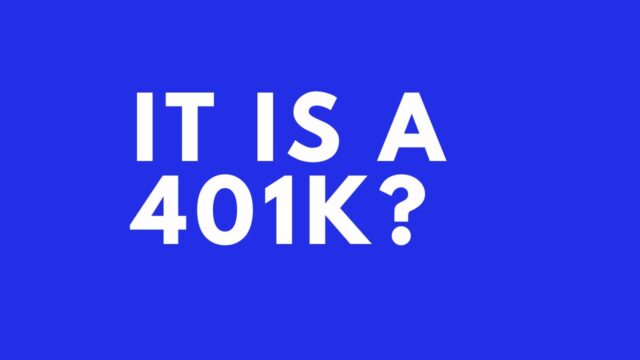
A 401k plan is a retirement plan that is available through an employer. It allows you to save and grow your nest egg using investments in the market. When you are ready to retire, you’ll have a larger amount available for you to use. 401ks are qualified tax-advantaged accounts. This means they meet certain requirements from the IRS that lets you save money on taxes. These accounts are usually held with brokers, such as Vanguard or Fidelity.
How does it work?
After you open a 401k account, you can begin to add money to it. This money will then be invested in the market. You may have some options. A target-date fund is usually an easy choice because it allows you to “set it and forget it”. Regardless, of what investment options you choose, be sure to choose a well-diversified portfolio. Once you are ready to retire after age 59 ½, you can withdraw your money penalty-free. You can choose to withdraw funds early in case of an emergency. But be aware, you may have to pay penalties.
How do contributions work?
You can make contributions to your 401k with contributions from your paycheck. Usually, this is a % of your paycheck that automatically is put into your account. You choose a percentage to contribute and your employer takes care of the rest. Since it is an automatic contribution, you are more likely to save each paycheck. This is a benefit because it can help ensure you are consistently putting money away for retirement. You may have the choice to make contributions on a traditional or Roth basis. This is based on how you contribute. Traditional contributions are pre-tax. This means taxes are not withheld before the money is put into your retirement account. Instead, you may have to pay taxes on it when you are withdrawing money in retirement. However, if you meet certain requirements, you may be able to deduct your contributions during the current tax year. The other option is to make Roth contributions. These are after-tax, so you do not have to pay taxes during withdrawal. Both traditional and Roth contributions have their pros and cons. The best option for you will be based on the options available and your financial situation. In addition to the contributions you make, your employer may also make contributions to your 401k. This is usually a percentage “match” based on your contribution. Your employer contribution is usually outlined as part of your benefits, so you may want to ask your HR department for help. It may take some time before your match becomes “vested”. “Vested” means the money is yours, even if you leave your employer.
Can I lose money in a 401k?
Money that has been invested in a 401k is invested in the stock and bond markets. This means it is subject to the volatility of the market. Unlike a savings account, your money is not guaranteed. You may lose money. In fact, your balance will probably go up and down over time as the market changes. However, overall, you can expect to earn more money over time. Historically, you may earn between 5-8% on your investments. This is the power of compounding. The more money you put in and the longer you have money invested, the more money you should earn.
How much can I contribute to my 401k?
Contribution limits are based on tax years and are updated every few years. For 2020, you can contribute up to $19,500 to your 401k. If you are over 50 years old, you can make a catch-up contribution of an extra $6,500. In order to save enough, most experts suggest that you should try to save at least 10-15% of your gross income for retirement. At minimum, try to save enough to meet max out your employer contribution if available, as this is essentially free money.
How do I get a 401k plan?
401k plans are available through employers that offer them. Your employer will help you access the system to enroll in the plan. From here, you can set your contributions and investments. You may access your plan through a provider such as ADP. Your money will be held with a broker such as Vanguard or Fidelity. 401k plans are employer-sponsored. If you are self-employed or your employer does not offer a 401k, you may not be able to access one independently. However, there may be other options.
How can I save for retirement if my job has no 401k?
Many individuals are eligible to open Independent Retirement Accounts (IRAs). These do not require employer participation and are easy to access. You can choose from Roth and Traditional IRAs, just as with 401k accounts. If you are self-employed, you may have additional options. Solo 401ks and Simplified Employee Pension (SEP-IRA) may be good options depending on your business and personal set-up. 401k plans are valuable because they can help you save for retirement easily and consistently. The longer you save in your retirement plan, the more money you’ll have in the future. So, be sure you start saving now and your future safe will thank you later.


































